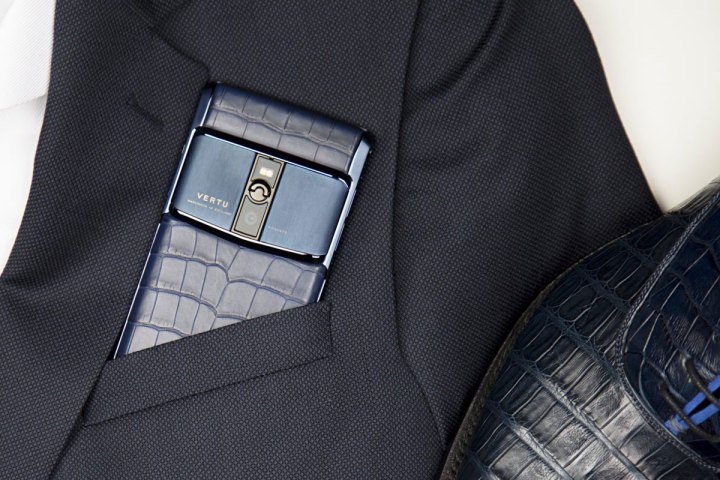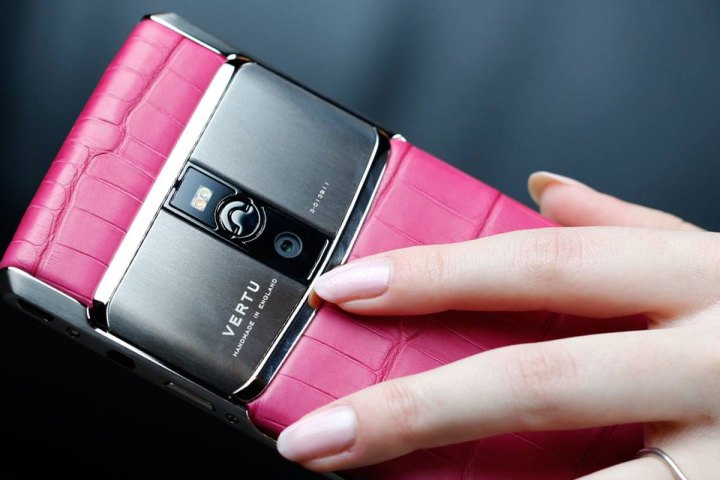
“If we’ve been quiet, it’s just part of the process after coming out of a successful sale.”
“If we’ve been quiet,” Jon Stanley told Digital Trends, “it’s just part of the process after coming out of a successful sale.” Originally part of Nokia, this is the second time Vertu has found itself under new ownership, but it sees the change as a great opportunity. “We paused for breath, checked what customers are looking for, and where the market is heading. What we’re seeing now is Vertu 3.0, and we’ve got a clear plan of where to go in the future.”
Vertu 3.0
Vertu 3.0 is preparing to meet a new entrant into the industry — Sirin Labs, a startup with a $15,000-plus phone that’s apparently set for launch in May. Except Vertu isn’t bracing to meet it head on in battle — it’s welcoming the newcomer, instead. “We’ve long been the sole voice in luxury tech,” added Gordon Watson, Vertu’s new CEO, “and more brands mean a louder voice. It’s a win-win.”
Gordon Watson came on as CEO in February, having worked for Vertu in various positions including VP of Sales and Marketing, over the past six years. He was aware Sirin Labs had been developing a product.
“From both a personal and a professional perspective, I see it as a positive thing. There are opportunities to be had in the luxury tech market, with the right product. Until today, Vertu has been the only brand with any staying power,” he said. “What frustrates me is when brands come and go. It makes people ask if the luxury tech category is relevant.”
Does luxury have a place in the tech world?
If it didn’t have a place in the tech world before, luxury certainly does now. Over the past months, Samsung has partnered with de Grisogono, Apple with Hermes, and TAG Heuer has enjoyed success with its Carrera Connected watch. “Tech is plateauing,” Watson explained. “Brands are looking to bring bespoke, tactile elements to products, and more people who enjoy success want to stand out from the crowd.”
“That’s not to say it’s not a tough market,” Jon Stanley added on the subject of the recent surge in lux-tech. “Co-ordinating high-tech components produced in the hundreds of millions with artisan-produced materials [which could number in the dozens] is a unique challenge. It’s very difficult to get right.”
Vertu, however, has been around for a while, and it has things worked out. “It’s a stable concept,” Stanley said. “We know what makes Vertu tick.”
Luxurious wearables are on the way
The company’s confidence in the importance of luxury tech fuels Vertu 3.0. Watson talked about its strategy for 2016 and beyond. “We’re well on our way for the next product launch, which will be during the last three months of this year, and we’ve redefined our product roadmap until the end of 2018.” Does that mean Vertu’s looking at other products, outside of smartphones?
“I think it’s inevitable that we will enter the wearables market. It’s more a question of when,” Watson admitted. “We have concepts in development. It’s choosing the right one that targets our customers.”

Jon Stanley agreed, saying, “There’s a Vertu way of doing things. Reliability is the staple of the luxury industry. It’s no good coming out with something first, we want to come with something significantly better than others.”
Despite the hype around wearables, Vertu’s wary of smartwatches. “Nobody has hit the sweet spot with wearables, there’s still work to be done. We need to see how a watch would fit into the Vertu ecosystem,” concluded Stanley.
What’s next for Vertu?
If there are changes to the product line-up afoot, there aren’t any regarding the way things are done at Vertu. It’s still very much a British brand, and there are no plans to change production, research and development, or design. Instead, in the aftermath of its successful sale, and on the back of the May holiday weekend where sales grew globally by 10 percent over last year, Vertu has embraced the chance to “refine where we’re going on the next part of our journey,” according to Watson and Stanley.
“That sounds like we could see some surprises,” I said. The pair jokingly retorted, “We’re always coming up with surprises!” Perhaps the surprise right now is that Vertu, ever the king of the niche luxury market, has again emerged from another sale, seemingly stronger than ever before.





